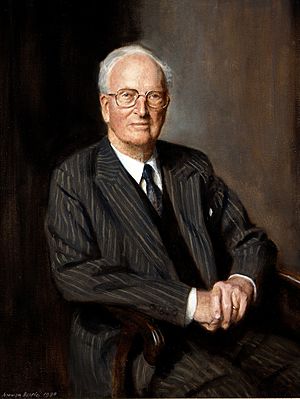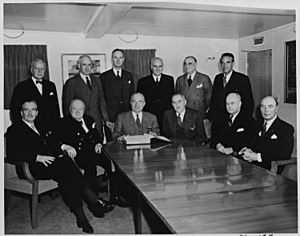Oliver Franks, Baron Franks facts for kids
Quick facts for kids
The Lord Franks
|
|
|---|---|

Franks in 1990, by Norman Hepple
|
|
| British Ambassador to the United States | |
| In office 1948–1952 |
|
| Monarch | George VI Elizabeth II |
| President | Harry Truman |
| Prime Minister | Clement Attlee Winston Churchill |
| Preceded by | The Lord Inverchapel |
| Succeeded by | Roger Makins |
| Personal details | |
| Born |
Oliver Shewell Franks
16 February 1905 Selly Oak, Birmingham, England |
| Died | October 15, 1992 (aged 87) Oxford, England |
| Education | The Queen's College, Oxford |
| Occupation | Civil servant and philosopher |
Oliver Shewell Franks, Baron Franks (16 February 1905 – 15 October 1992) was an important English civil servant and philosopher. Many people say he was one of the key figures who helped shape the world after the Second World War.
Franks played a big part in Britain's recovery after the war. He was made a knight in 1946. From 1948 to 1952, he served as the British Ambassador to the United States. During this time, he worked hard to make the relationship between the two countries stronger. He was given a special lifetime title, called a life peerage, on 10 May 1962.
Lord Franks was often asked by the government to lead important investigations. He is most famous for his report after the Falklands War. This report cleared Prime Minister Margaret Thatcher and her government of blame. It stated they had not ignored warnings about an Argentine invasion.
Contents
Early Life and Education
Oliver Franks went to Bristol Grammar School and then to Queen's College, Oxford. He became a university teacher at Oxford. He was also the head of Worcester College.
He studied moral philosophy, which is about what is right and wrong. He taught this subject as a professor at the University of Glasgow from 1936 to 1946. Oliver Shewell Franks married Barbara Tanner on 3 July 1931. They had two daughters. Barbara passed away in 1987.
Helping Britain During World War II
When the Second World War began, Franks started working for the Ministry of Supply. This department was in charge of making sure the army had enough equipment and supplies. He quickly rose through the ranks and became the Permanent Secretary by 1945.
During the war, he became well-known for his quick actions. He managed to replace all the supplies lost after the Dunkirk battle. He also replaced supplies that were lost during the Battle of the Atlantic. After the war, he continued to work at the Ministry of Supply. He gave a famous talk about how central planning helped during wartime and how it could help in peacetime too.
Post-War Contributions
Franks supported the Liberal Party and was a big fan of Prime Minister Clement Attlee. He was also admired by Ernest Bevin, a very important politician at the time. Franks often spoke with leaders like Winston Churchill and Jawaharlal Nehru.
After being the head of Queen's College from 1946 to 1948, he was asked to lead the British team. This team took part in European talks about George Marshall's ideas for aid, known as the Marshall Plan. He helped create NATO (North Atlantic Treaty Organisation), which is a military alliance. He also became the chairman of the Organisation for European Economic Cooperation.
In 1948, he became the ambassador to the United States. There's a funny story about him from early in his time there. A radio station in Washington asked ambassadors what they wanted for Christmas. Other ambassadors gave serious answers about world peace or freedom. Sir Oliver Franks misunderstood the question. He said, "Well, it’s very kind of you to ask. I’d quite like a box of crystallised fruit."
When he returned to England from Washington, he became the Chairman of Lloyds Bank. He held this position from 1954 to 1962. He also served as the head of Friends Provident from 1960 to 1962.
Later Life and Public Service
In 1954, Franks gave the BBC Reith Lectures. These were a series of six radio talks called Britain and the Tide of World Affairs. In these talks, he discussed how politics were changing after the war. He also talked about Britain's new relationships with other countries around the world.
In 1960, he almost became the Chancellor of Oxford University. He came in a close second to Harold Macmillan. Franks received 1,607 votes, while Macmillan got 1,697 votes. From 1962 to 1976, he was the head of Worcester College, Oxford. He also led a special investigation at Oxford University in 1964–65. From 1965 to 1984, he was the Chancellor of the University of East Anglia.
At 77 years old, in 1982, he led an important inquiry. This investigation looked into the events that led up to the Falklands War. He also served as the Chairman of many important organizations. These included the Board of Governors of the United Oxford Hospitals and the Wellcome Trust. He was also involved with the Rhodes Trust and the Rockefeller Foundation. Oliver Franks passed away at the age of 87.
Honours
Franks received several important honours for his service:
- Commander of the Order of the British Empire, 1942.
- Knight Commander of the Order of the Bath, 1946.
- Privy Counsellor, 1949.
- Knight Grand Cross of the Order of St Michael and St George, 1952.
- Life peerage, as Baron Franks, 10 May 1962.
- Order of Merit, 1977.
 | Janet Taylor Pickett |
 | Synthia Saint James |
 | Howardena Pindell |
 | Faith Ringgold |


